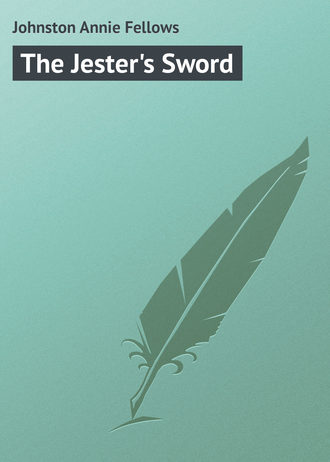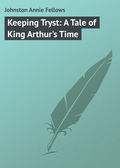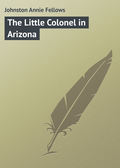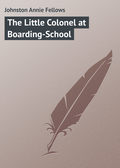
Johnston Annie Fellows
The Jester's Sword
"Because thou art a king's son," said the Jester. "That in itself is ample reason that thou shouldst play more royally than other men whatever part Fate may assign thee."
Aldebaran sat wrapped in thought. "Well," was the slow reply after long pause, "an hundred years from now, I suppose, 'twill make no difference how circumstances chafe me now. A poor philosophy, but still there is a grain of comfort in it. I'll take thy offer, friend, and give thee gratitude."
And so next day the two went forth together. Aldebaran showed a brave front to the crowd, glad of the painted mask that hid his features, and no one guessed the misery that lurked beneath his laugh, and no one knew what mighty tax it was upon his courage to follow in the Jester's lead and play buffoon upon the open street. It was a thing he loathed, and yet, 'twas as the Jester said, his training in the royal court had made him sharp of wit and quick to read men's minds; and to the countrymen who gathered there agape, around him in the square, his keen replies were wonderful as wizard's magic.
And when he piped – it was no shallow fluting that merely set the rustic feet a-jig, it was a strange and stirring strain that made the simplest one among them stand with his soul a-tiptoe, as he listened, as if a kingly train with banners went a-marching by. So royally he played his part, that even on that first day he surpassed his teacher. The Jester, jubilant that this was so, thought that his time to leave was near at hand, but when that night they reached his dwelling Aldebaran tore off the painted mask and threw himself upon the hearth.
"'Tis more than flesh can well endure!" he cried. "All day the thought of what I've lost was like a constant sword-thrust in my heart. Instead of deference and respect that once was mine from high and low, 'twas laugh and jibe and pointing finger. And, too" (his voice grew shrill and querulous), "I saw young lovers straying in the lanes together. How can I endure that sight day after day when my arms must remain for ever empty? And little children prattled by their father's side no matter where I turned. I, who shall never know a little son's caress, felt like a starving man who looks on bread and may not eat. Far better that I crawl away from haunts of men where I need never be tormented by such contrasts."
The Jester looked down on Aldebaran's wan face. It was as white and drawn as if he had been tortured by the rack and thumbscrew, so he made no answer for the moment. But when the fire was kindled, and they had supped the broth set out in steaming bowls upon the table, he ventured on a word of cheer.
"At any rate," he said, "for one whole day thou hast kept thy oath. No matter what the anguish that it cost thee, from sunrise to sunsetting thou hast held Despair at bay. It was the bravest stand that thou hast ever made. And now, if thou hast lived through this one day, why not another? 'Tis only one hour at a time that thou art called on to endure. Come! By the bloodstone that is thy birthright, pledge me anew thou'lt keep thy oath until the going down of one more sun."
So Aldebaran pledged him one more day, and after that another and another, until a fortnight slowly dragged itself away. And then because he met his hurt so bravely and made no sign, the Jester thought the struggle had grown easier with time, and spoke again of going to his kindred.
"Nay, do not leave me yet," Aldebaran plead. "Wouldst take my only crutch? It is thy cheerful presence that alone upholds me."
"Yet it would show still greater courage if thou couldst face thy fate alone," the Jester answered. "Despair cannot be vanquished till thou hast taught thyself to really feel the gladness thou dost feign. I've heard that if one will count his blessings as the faithful tell their rosary beads he will forget his losses in pondering on his many benefits. Perchance if thou wouldst try that plan it might avail."
So Aldebaran went out determined to be glad in heart as well as speech, if so be it he could find enough of cheer. "I will be glad," he said, "because the morning sun shines warm across my face." He slipped a golden beam upon his memory string.
"I will be glad because that there are diamond sparkles on the grass and larks are singing in the sky." A dew-drop and a bird's trill for his rosary.
"I will be glad for bread, for water from the spring, for eyesight and the power to smell the budding lilacs by the door; for friendly greetings from the villages."
A goodly rosary, symbol of all the things for which he should be glad, was in his hand at close of day. He swung it gaily by the hearth that night, recounting all his blessings till the Jester thought, "At last he's found the cure."
But suddenly Aldebaran flung the rosary from him and hid his face within his hands. "'Twill drive me mad!" he cried. "To go on stringing baubles that do but set my mind the firmer on the priceless jewel I have lost. May heaven forgive me! I am not really glad. 'Tis all a hollow mockery and pretence!"
Then was the Jester at his wit's end for a reply. It was a welcome sound when presently a knocking at the door broke on the painful silence. The visitor who entered was an aged friar beseeching alms at every door, as was the custom of his brotherhood, with which to help the sick and poor. And while the Jester searched within a chest for some old garments he was pleased to give, he bade the friar draw up to the hearth and tarry for their evening meal, which then was well-nigh ready. The friar, glad to accept the hospitality, spread out his lean hands to the blaze, and later, when the three sat down together, warmed into such a cheerfulness of speech that Aldebaran was amazed.







